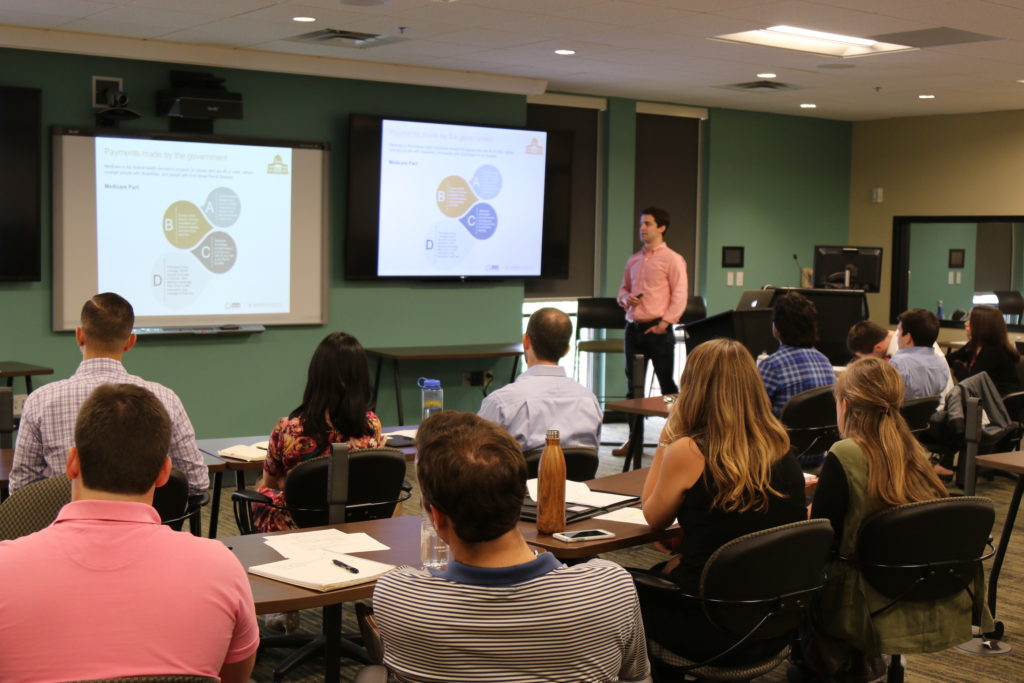By Kara Sherrer
Many business students have already begun the recruiting cycle in earnest; some even know where they’ll be interning next summer. For MBA candidates interested in health care, recruiting doesn’t follow a specified schedule. In fact, when Matt Sternberg (MBA’18) left campus at the end of his first year, he didn’t even have an internship finalized.
Sternberg, president of the Vanderbilt Business Healthcare Association (VBHA), discussed his internship search with a group of first-year MBAs at the VBHA’s annual Healthcare Symposium event, held last Friday. Run by students, for students, the symposium seeks to help new MBAs understand the informal and irregular recruiting process for health care internships, as well as give them a primer on basic industry knowledge.
THE INTERNSHIPS
Sternberg secured an internship shortly after classes finished, thanks in part to connections through the Center for Entrepreneurship at Owen. He also consulted for some health care startups. Sternberg’s internship story may sound unusual compared to students from other verticals, but his late-breaking offer is actually pretty typical in an industry that moves very slowly.
“People are getting (health care) internships in Mod I and Mod II and Mod III and Mod IV, and that’s just how the process works. You can’t let that deter you…it all ends up working out,” affirmed Doug Chod (MBA’18), VP of Finance for VBHA.
The symposium opened with an interactive workshop, led by Sternberg, which helped students figure out their personal brand and how to communicate their value to healthcare recruiters. Then Scarlett Gilfus, Program Coordinator for the Health Care MBA , gave students an overview of Immersion Week, which falls between Mods I and II and offers students hands-on experiences in various aspects of the health care industry, including a rotation in an emergency room.

THE INDUSTRY
Professor Larry Van Horn, Executive Director of Health Affairs, dropped by for a few minutes to discuss the future of health care, which he believes is moving to a private-sector, consumer-based model.
Stenberg then walked students through the history of health care and the provider landscape before turning the presentation over to Chod, who discussed the major payors in the healthcare industry. Finally, Arielle Samet (MBA’18), VP of Alumni Relations for VBHA, gave an overview of major Nashville health care companies.
To end the symposium, the VBHA board brought seven more second-year MBAs up to the front for a rotating panel about their variety of health care experiences. The more seasoned students offered the new MBAs tactical advice on recruiting, telling them not to get discouraged if classmates in other tracks secured internships before they did.
“We wanted to make sure that we were giving (information) we thought would have been really, really valuable during the prior year,” said Samet, explaining why VBHA brought in so many second-year students for the panel. “We want to make it a community where the first years feel like they can approach us. They don’t have to treat us like the alums.”
People are getting (health care) internships in Mod I and Mod II and Mod III and Mod IV, and that’s just how the process works. -Doug Chod
KEY TAKEAWAYS:
Networking is king. “Health care is a very network-driven industry, especially in Nashville,” Sternberg told attendees during his opening talk, and the other student speakers throughout the afternoon seconded his opinion. During the panel, Bill Faucher (MBA’18) encouraged first years to reach out to alumni, even though it can be intimidating to email someone cold. “I have yet to have a single alum turn me down, or not respond to me,” he said. He recommended that students keep a spreadsheet of their health care contacts and when they last connected, so they can track their networking touch points throughout the school year.
Start early and be patient. Because health care recruiting is so informal, students need to build relationships from the very beginning, reaching out to alums for informational interviews and attending networking events. After the relationship is built, they can inquire if the company has a need for summer interns. Students need to keep in mind that health care recruiting is a long game; even with an early start, it may take months to secure an internship offer — so don’t panic.